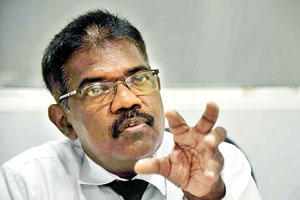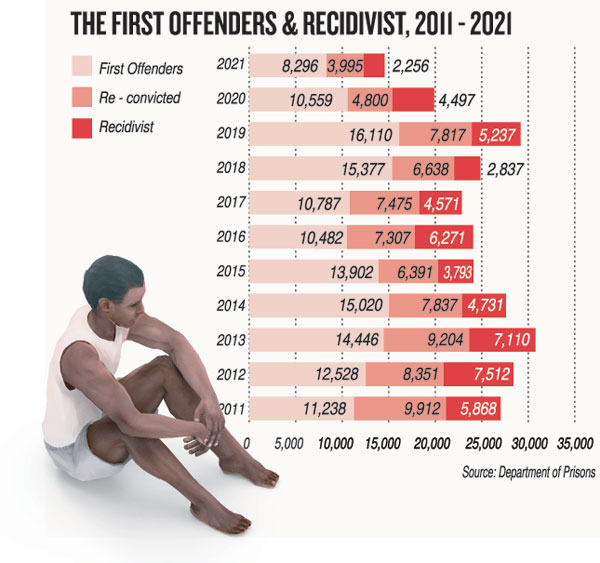News
Prisoner art revives concern about rehab failures and inhumane conditions
View(s):By Minaza Hassan
An art exhibition has drawn attention to the untapped talent and creative potential of prisoners in Sri Lanka’s overcrowded jails.
‘Siranovu Sithuvam (unimprisoned paintings)’ was held this week at the Colombo Public Library as a recovery programme in celebration of National Prisoners’ Day on September 11.
According to the exhibition organisers, the Lanka Prisoners’ Fellowship, 30 exhibits were sold.
The fellowship collaborated with the Prisoners’ Welfare Association and had the support of the Colombo Municipal Council and others.

Senaka Perera
Poetry writing and other such development programmes have also been initiated in the attempts at rehabilitation. In 2018, Chandana Ekanayake, the then commissioner of prisons in charge of rehabilitation at prison headquarters, launched a project where he compiled a publication of poetry by prisoners. This project has continued, and currently, two publications, including “Sipirige Pamula,” have been produced. A third publication is expected this year, said Mr. Ekanayake.
Despite these initiatives, Austin Fernando, the president of the Prisoners’ Welfare Association and the former presidential secretary, believes that more needs to be done. “We hardly hear of rehabilitation or making them better people because we do not have the institutional setup; we have a system that is geared towards punishing prisoners and not rehabilitating them.
And the lack of rehabilitation has led to more crimes, he said.
The past three years statistics show that an average of 40% of the prisoners are those who have returned for a second time or more, with some returning for a 10th time.
According to a survey by the Human Rights Commission of Sri Lanka this year, in 20 prisons, it was revealed that the treatment and detention conditions of prisoners fall far below the threshold of basic living standards.
“The rate of imprisonment has increased over the years,” said Mr. Fernando.
While prisons remain overcrowded and unlivable, the state’s failure to maintain basic living standards in prisons is reflected in society with an increase in the crime rate, with over 40% becoming repeat offenders and returning to prison, according to recent reports from the Department of Prisons.
However, socioeconomic and political factors may also be a contributor to creating an inducing environment for crime, Mr. Fernando noted.
Prison Department reports show that the crime rate for first-time offenders increased by a small percentage as well during 2019–2022, when the economic crisis and COVID-19 were at their peak, suggesting that socioeconomic and political factors can impact people’s lives in relation to committing crimes. 
In Sri Lanka’s prisons, offenders are often further exposed to inhumane conditions that may determine that once they enter prison, they’ve entered a life of crime.
“Custody, Care, and Corrections” is the motto of the Prison Department, said Senaka Perera, lawyer, activist, and chairman of the Committee on Protecting the Rights of Prisoners. He insisted that rehabilitation was the main goal of imprisonment.
The reduction and deterrence of crime is one of the fundamental aims of imprisonment; the increase in the crime rate is an indication that imprisonment as a measure is not practised well.
People are not made aware of all of their rights when they enter prison, and their rights as prisoners are not maintained to full effect, Mr. Perera explained. For example, a prison cell meant for two is often shared by over a dozen.
“The occupancy of prisons is so large you can’t even go to the toilet. There are people of various criminal backgrounds in the same room; they can’t sleep,’’ Mr. Fernando said.
According to the report from the Human Rights Commission of Sri Lanka, prison conditions could potentially result in “released prisoners resorting to further criminality after release to survive” as the system does not support rehabilitation and integration back into society.
“It is evident that the inefficiency lies in the measures to promote social integration of the people who get caught; we don’t have a system where they are sent on parole and looked after by various non-governmental or charity organisations or alternative support systems for people who may need them,’’ Mr. Fernando said.
Stigma against prisoners or individuals who have been to prison may be yet another contributory factor towards the inducement of crime, Mr. Fernando said.
Early conditional releases and probation orders are yet another prisoners’ right that is not functionally practised, he said. Early conditional releases (also known as revision systems) are provided based on criteria such as observed good behaviour. However, several prisoners are denied their release despite being eligible, Mr. Perera said.
Yet another mismanagement is when remand prisoners are sentenced, the time already spent in prison before trial is not taken into consideration. A large number of prisoners are drug offenders, Justice Minister Wijeyadasa Rajapakshe said.
The overwhelming number of remand prisoners is due to overburdened courts, improper practice of revision systems, and a lack of alternative support systems such as rehabilitation facilities for drug offenders.
Legal reforms are being drafted to restore prisoners’ rights, Mr. Rajapakshe said. Rehabilitation centres are being considered for drug offenders.
The best way to say that you found the home of your dreams is by finding it on Hitad.lk. We have listings for apartments for sale or rent in Sri Lanka, no matter what locale you're looking for! Whether you live in Colombo, Galle, Kandy, Matara, Jaffna and more - we've got them all!

